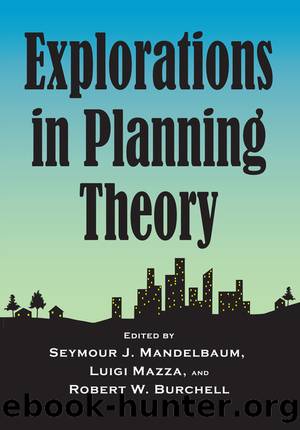Explorations in Planning Theory by unknow

Author:unknow
Language: eng
Format: epub
Tags: Architecture, Urban & Land Use Planning, Political Science, Public Policy, City Planning & Urban Development, Regional Planning
ISBN: 9780882851549
Google: 4atPAAAAMAAJ
Amazon: B0761WZRX3
Barnesnoble: B0761WZRX3
Goodreads: 36678418
Publisher: Transaction Publishers
Published: 1996-01-01T00:00:00+00:00
PATSY HEALEY
13
The Communicative Work of Development Plans
INTRODUCTION
Development plans have a long history as tools of spatial planning. In the United Kingdom (and in many other places) they often represented directives within a model of planning that assumed that public authorities, informed by scientific knowledge and guided by consensual goals, controlled the course of urban growth. That model has been generally rejected in recent years. Planning authorities have had neither the power nor the inclination to ensure that cities develop âaccording to plan.â Both scientific knowledge and a consensual âpublic interestâ are now seen as highly contestable.
The directive model has been replacedâin the minds of theorists if not practitionersâby an interactional, âpost-positivistâ image of the relations between planning authorities, developers, community groups, and all those concerned with the spatial organization and design of places. In this more pluralist model, plans are seen to perform multiple roles, sending quite different messages to different âaudiences.â The plan, in turn, may mean different things to different groups.
How, then, are we to âinterpretâ the development plans we come across? What assumptions do they express; what messages are conveyed? What implications do plans have for the power relations that surround the management of environmental change? How do plans and planning change these relations?
THEORETICAL EXCURSION
The âcommand-and-controlâ model was sustained by concepts from architecture, engineering, regional science, and scientific rationalism. These directed attention to the internal logic and analytical coherence of a planâs design. As Mazza (1986) has argued, such internal consistency is an unlikely property of plans produced through interaction rather than the intelligence of a single mind. He proposed that plans should be seen as sets of technical and political claims, to be understood in the context of relations external to the text. Specifically, Mazza argues, that we have to attend to the evaluation of political and not merely technical claims. Fischer (1990) argues similarly that policy analysis involves both rational-technical and normative claims: the first may be validated through a âscientificâ method, but the second brings us into the domain of moral philosophy.
Evaluation and validation do not, however, exhaust the concerns of theorists with development plans. Who, we should wonder, makes the claims embedded in a plan? To whom are they made? How are they understood, and how should they be interpreted? Critical political economists have traditionally argued that all plans should be understood as political mystifications, protecting property interests in the guise of expressing âthe public interestâ:
Download
This site does not store any files on its server. We only index and link to content provided by other sites. Please contact the content providers to delete copyright contents if any and email us, we'll remove relevant links or contents immediately.
Zero to IPO: Over $1 Trillion of Actionable Advice from the World's Most Successful Entrepreneurs by Frederic Kerrest(4532)
Machine Learning at Scale with H2O by Gregory Keys | David Whiting(4296)
Never by Ken Follett(3937)
Harry Potter and the Goblet Of Fire by J.K. Rowling(3849)
Ogilvy on Advertising by David Ogilvy(3610)
Shadow of Night by Deborah Harkness(3361)
The Man Who Died Twice by Richard Osman(3073)
Book of Life by Deborah Harkness(2935)
The Tipping Point by Malcolm Gladwell(2914)
Will by Will Smith(2912)
0041152001443424520 .pdf by Unknown(2844)
Purple Hibiscus by Chimamanda Ngozi Adichie(2829)
My Brilliant Friend by Elena Ferrante(2824)
How Proust Can Change Your Life by Alain De Botton(2808)
How to Pay Zero Taxes, 2018 by Jeff A. Schnepper(2647)
Hooked: A Dark, Contemporary Romance (Never After Series) by Emily McIntire(2551)
Rationality by Steven Pinker(2352)
Can't Hurt Me: Master Your Mind and Defy the Odds - Clean Edition by David Goggins(2325)
Borders by unknow(2304)
